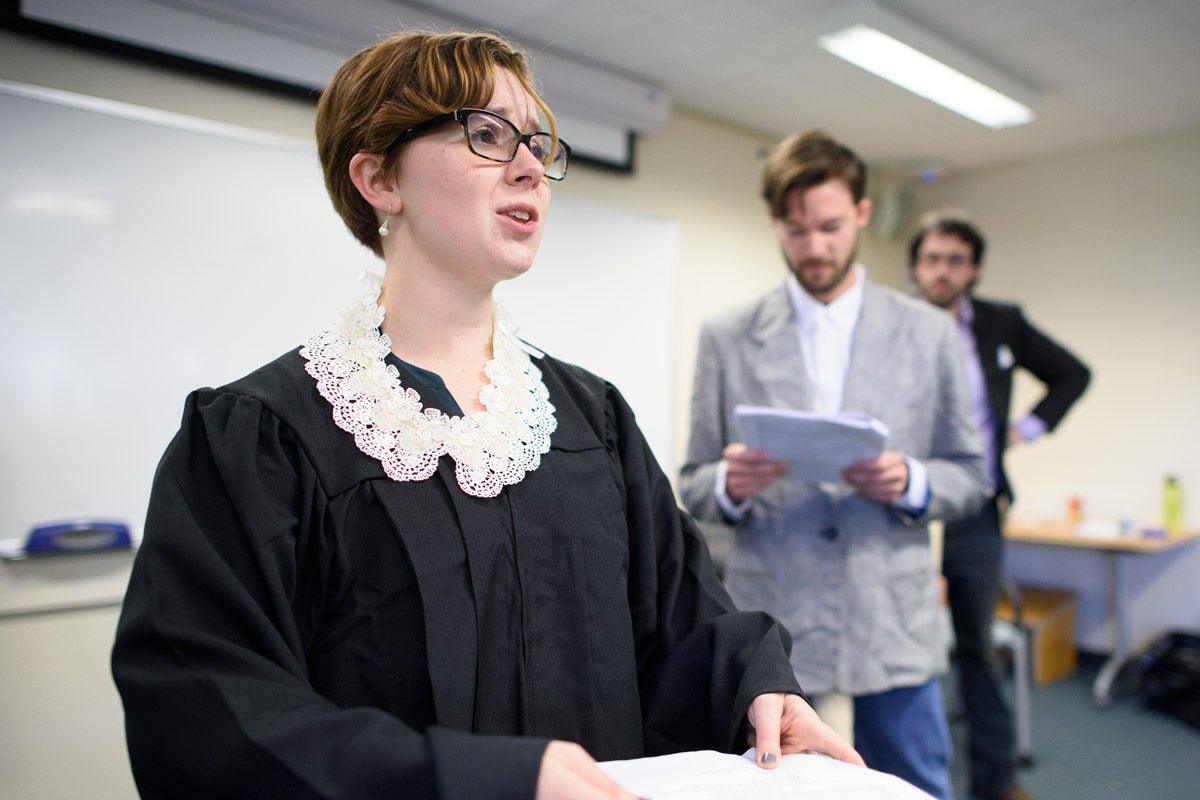
Stanford Classics in Theater performs “Men’s Rites: An Alt-Comedy” on Friday and Saturday at the Elliott Program Center. (Image credit: Stanford Classics in Theater)
It’s a summer day in Sonoma Valley’s Bohemian Grove, where the country’s most powerful men gather to cavort, perform mysterious rituals and cement their social and political power.
This year, however, they have a different agenda: whether to bar women from comedy and from voting.
This is the premise of Men’s Rites: An Alt-Comedy, which will be staged at 8 p.m. this Friday and Saturday (May 12 and 13) at the Elliott Program Center. Though it may seem distant from any kind of ancient literary work, Men’s Rites, a Stanford Classics in Theater (SCIT) production, is in fact a translation and adaptation of Aristophanes’ 411 BCE comedy, The Thesmophoriazusae.
Gender-swapping a classic
In the original The Thesmophoriazusae, Athenian women convene at the annual, women-only Thesmophoria festival. Fearing that the women will sentence him to death for his unflattering depiction of them, the playwright Euripides asks a male relative to dress as a woman and infiltrate the festival to advocate on his behalf.
The problem, according to Stephen Sansom, co-director of Men’s Rites, is how condescending the original play is toward women. SCIT’s answer is gender-swapping, changing the plot to involve a woman infiltrating a festival for men, which opened new possibilities.

Stanford graduate students in classics translated and adapted an ancient Greek play to lampoon modern politics. In this scene from rehearsal, Lizzy Ten-Hove portrays Supreme Court Justice Ruth Bader Ginsburg while David Pickel portrays political strategist Steve Bannon and Kilian Mallon plays Liberty University President Jerry Falwell Jr. (Image credit: L.A. Cicero)
“The jokes work better in this gender-swapped version than if we had used the original premise,” said Alyson Melzer, SCIT’s president. “The complaints that the women would have been presenting in this modern adaptation would have been legitimate, which is much less funny.”
After deciding to gender-swap The Thesmophoriazusae, the SCIT team had to decide which men the assembly would represent. “We asked ourselves, ‘Who are the men Aristophanes would want to make fun of?’” said Sansom.
Sansom said the answer was “the people with the most power, the people that are the least challenged.” In other words, said Sansom, the Men’s Rights Movement.
The Men’s Rights Movement is a group of activists who believe that they are discriminated against because they are men. Many men’s rights activists believe that men are victimized by women in general and feminists in particular.
“The illegitimacy of men’s rights complaints about their perceived victimhood makes them perfect Aristophanic targets,” said Edward Kelting, last year’s SCIT president.
According to Melzer, the original play “was making fun of a group of people who are feeling victimized but weren’t actually victims.” With men’s rights as the target, “we can be truer to the original.”
Translation and adaptation
Each year, a committee of graduate students in the Department of Classics votes to satirize current events by adapting and translating an ancient comedy. Targets in years past have included the 2016 Republican Party, Silicon Valley tech-libertarianism and Gilded Age robber barons.
“Most adaptations,” Kelting said, “are straight translations or loosely based on the plot.”
To illustrate, he compared the 2000 film Oh Brother, Where Art Thou? to the Odyssey. Though the film makes no explicit reference to Homer, savvy movie-goers can see the resemblance. Unlike the film, added Kelting, “a substantive adaptation that is still based on the text,” like SCIT’s, “is unique.”
Before they began production, the translators outlined the adaptation and some of the major characters. This year’s cast features U.S. Supreme Court Justice Ruth Bader Ginsburg and Trump political adviser Steve Bannon among other notables. Then, “we sit down with the material,” said Kelting, “mixing a desire to get small-grained jokes with a more holistic interpretation.”
“Looking at the original Greek forces us to think more carefully about what’s actually going on in the text,” Melzer said. “We have to be more intentional about any change we make away from the Greek.”
Though translation from the original Greek is more demanding, “the extra time and energy is definitely worthwhile,” Kelting said. Sansom added it’s “uniquely Stanford.”
The value of ancient satire
Regardless of whether a 2,500-year-old comedy could resonate with a modern audience, Kelting said that ancient comedies like The Thesmophoriazusae teach something important about the place of satire in a democracy.
“We have to appreciate that Aristophanes making excrement jokes and making fun of very powerful politicians was an in-built feature of the society,” he said, pointing out that each play “was funded by the people and was a meaningful part of public discourse. Aristophanes teaches us that satire of those in power is an intrinsic good [and] that we should come together as citizens to make fun of those in power.”
“Satire was a key feature of Greek culture,” Sansom continued. Translating and performing ancient satires tells us about “how people in antiquity dealt with similar power struggles, group dynamics, gender dynamics in the past.”
“Also,” he added, “it will be funny.”